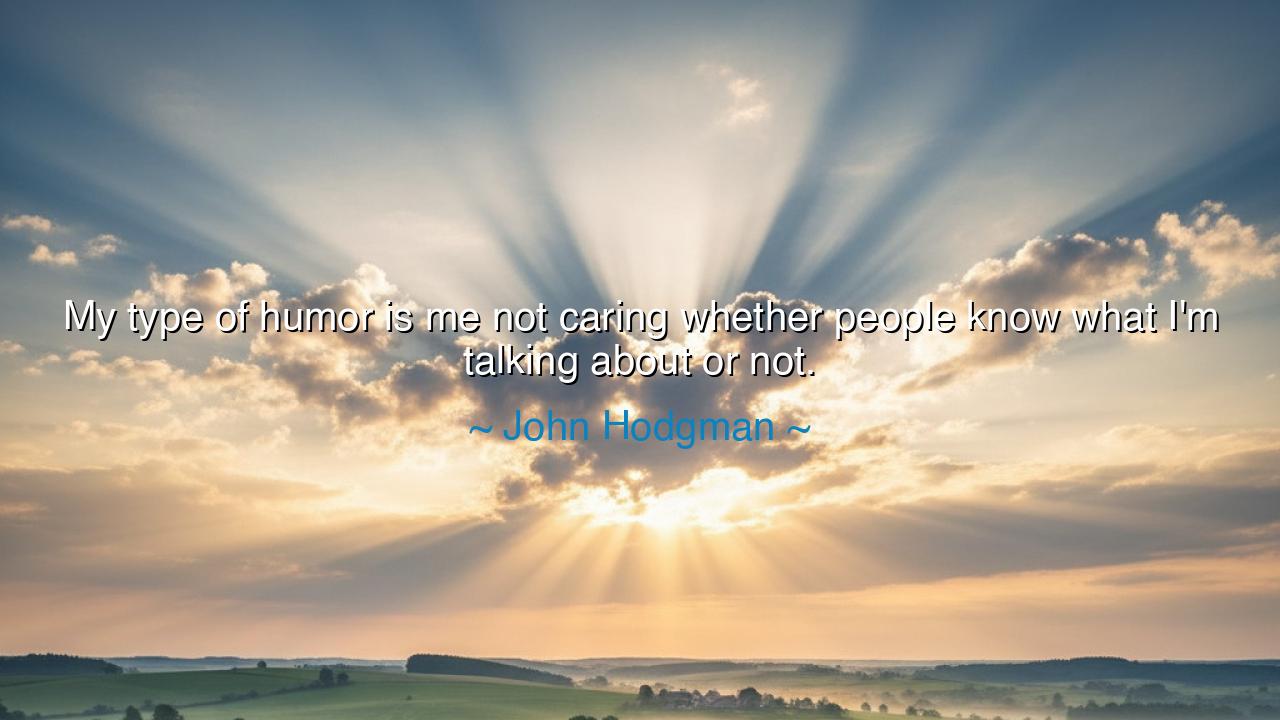
My type of humor is me not caring whether people know what I'm






The words of John Hodgman, “My type of humor is me not caring whether people know what I’m talking about or not,” speak with the voice of the independent spirit — one who refuses to chain his creativity to the understanding or approval of others. Beneath the veil of comedy lies a declaration of freedom, a fierce insistence that art must be born from truth, not consensus. In this statement, Hodgman reveals the heart of the authentic artist: the one who creates not to please, but to express; who speaks not to be understood by all, but to speak truthfully to himself and to those who can hear.
In the ancient world, this sentiment would have been praised as a mark of integrity and courage. The philosophers of Athens, the poets of Rome, the mystics of the East — all knew the loneliness of speaking truths that few could grasp. The oracle of Delphi spoke in riddles, and yet her words shaped nations. The prophets of old were often mocked or ignored, for their vision was beyond the comfort of the crowd. So too, in Hodgman’s humor, there lives a quiet defiance — a willingness to be misunderstood, to walk the path of the eccentric rather than conform to the laughter of the majority. This is the humor of the seer cloaked in jest, the sage disguised as a fool.
True humor, after all, is not about recognition; it is about revelation. The one who makes others laugh only by confirming what they already know performs a service of comfort. But the one who makes others pause, who provokes laughter mixed with confusion or wonder, performs a service of awakening. Hodgman’s refusal to care whether his audience “knows what he’s talking about” is the mark of a humorist who trusts the power of mystery — who believes that meaning, like a spark, is not always handed to us but must be found in the darkness between words. Such humor does not beg for understanding; it invites the listener to seek it.
There is an ancient story of Diogenes the Cynic, who walked through the marketplace in broad daylight holding a lantern. When people mocked him and asked what he was doing, he replied, “I am looking for an honest man.” Many laughed, thinking him mad. Yet through his absurdity, Diogenes exposed a truth about hypocrisy and human pretense that outlived his mockers. He did not care whether they understood — his act was its own commentary, his humor its own wisdom. Hodgman’s words echo this same spirit: that sometimes laughter born of confusion is deeper than laughter born of agreement.
This kind of humor without concern is not arrogance; it is trust — trust in the audience, and trust in the power of authenticity. The artist who constantly fears misunderstanding will trim his words, soften his message, and lose the wild flame of originality. But the one who dares to speak his truth, even if none understand, honors something far greater — the integrity of the creative soul. For meaning does not always arrive at once. What is obscure today may be clear tomorrow, and what seems strange now may later be seen as prophetic. The wise creator knows this and sows his seeds of laughter freely, trusting that time itself will reveal their fruit.
There is also liberation in such indifference. To create or speak without needing to be understood is to reclaim the joy of creation itself. The Stoics taught that a person’s peace depends not on the opinions of others, but on their own mastery of purpose. To live, to write, to joke without craving approval is to achieve a kind of freedom that few know — the freedom of the inner self unbound by the crowd. In this way, Hodgman’s humor is not merely style; it is philosophy. It teaches us to find pleasure in our own voice, to embrace the odd, the obscure, the unapologetically personal.
Let this then be the teaching: do not fear being misunderstood. Speak your truth, even if only you understand it. Create with honesty, not calculation. Whether in art, in humor, or in life, measure your worth not by applause, but by authenticity. The greatest voices of history — Socrates, Shakespeare, Emily Dickinson, Kafka — were all misunderstood in their time. Yet they spoke with courage, knowing that understanding is not a requirement for truth.
And so, as John Hodgman reminds us, the truest laughter — like the truest art — does not beg for permission. It springs from the heart of the creator, unfiltered, unashamed, and unafraid. Some will laugh with you, others will not. It matters little. For the purpose of humor, like the purpose of life, is not to be understood by all — but to express, to illuminate, and to live with the joy of being wholly, unapologetically oneself.






AAdministratorAdministrator
Welcome, honored guests. Please leave a comment, we will respond soon